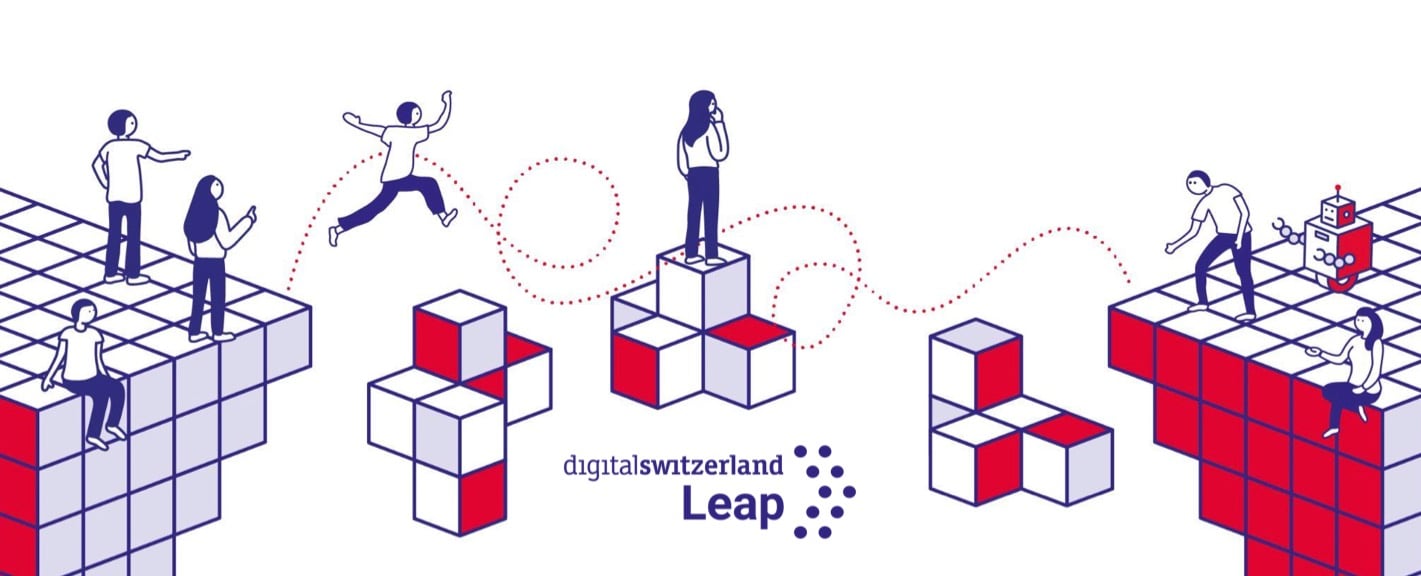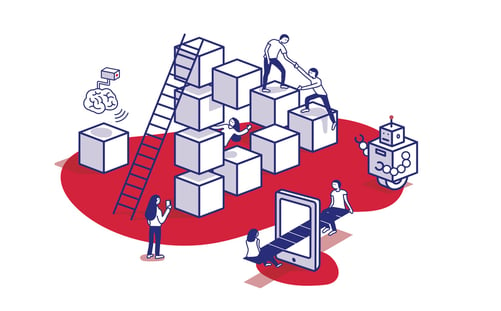
Use Case Overview: Sustainability Workshop Series in March 2021
Quick Navigation
#0 Introduction and Next Steps
#1 Promote circularity: Incentivize stakeholders and data access!
#2 Awareness and trust: Integrated Sustainable Buyers Guide!
#3 Let's build a platform to enable business to share their decarbonisation data!
#4 Let's empower businesses to become pioneers of decarbonisation!
#5 Let's incentivize all stakeholders and increase GHG business models!

***
With Leap - the platform for multi-stakeholder innovation in Switzerland - we conducted a Workshop Series focusing on the challenges and innovation potential of Sustainability with special attention to Circular Economy and Decarbonisation.
We are pleased to present to you the use cases we derived from the workshop.
In parallel to the workshop, we have submitted a pre-proposal together with EMPA on the topic of Decarbonisation as part of the Innosuisse Flagship Initiative.
Because the ideas from the workshop and the strategic direction of the pre-proposal align, we have decided to combine the two efforts, meaning that behind the use-cases below there is already a group of public and private organizations that intend to implement the use-cases.
Do you want to participate in this unique opportunity to work with world leading research institutes, seize the inter-organisational synergies and benefit from Innosuisse funding then please let us know by submitting the form below.
Learn more about Leap by visiting our website or reach out to us at leap@digitalswitzerland.com.
We look forward to shaping the future of a sustainable and circular Switzerland with you!
***
Use Case #1:
Promote circularity: Incentivize stakeholders and data access!
“How can cities incentivize circularity for businesses, and how can businesses economically benefit from circularity?”
Problem: Without greater accountability and incentives for all stakeholders (consumers, businesses, and society involved in the material flows of cities) businesses are not motivated to optimise and change their processes or business models for a more circular city.
The Goal: Set performance-based targets to reduce waste in all material flows, and create legal frameworks to support new emerging business models in a sharing and service-based economy. Value creation can be decoupled from resource intensity.
How to Win: Governments and cities need data, insights, and scenarios to be able to frame conditions in such a way that circularity is fostered, this includes creating incentives and taxation models.
For businesses, clear frame conditions (that do not distort competition dynamics) are needed to give business the longer-term security to invest into a more circular, value creating portfolio of products, services, and solutions. The aim is to decouple value from negative environmental impacts and shift from reliance on resource-intensive growth to new business models that benefit from circularity.
Do you want to create with us the digital services to access and transform GHG data of Swiss cities into decarbonisation actions?
***
Use Case #2:
Awareness and trust: Integrated Sustainable Buyer's Guide!
“How can we enable consumers to make educated decisions on their choices in a time-efficient manner to increase the use of circular products and services in cities”?
Problem: A major issue for consumers is the complexity of the circular economy in products and services. Simplification and guidance for consumers are a driving factor for behavioral change and help create new demand for circular products and services, which leads to a change of behavior of businesses.
The Goal: Provide tools to consumers to increase a more circular and sustainable behaviour before, during, and after the purchase of a product or service as an integrated service.
How to Win: Create innovative decision support tool for consumers on circular topics by demonstrating the impact of their individual actions and offering integrated resale & repair platforms. Technology is essential to provide the data, information, and guidance in a very simple way, to not overwhelm but enable consumers to make efficient and educated buying decisions to promote the purchase of circular products and services.
Do you want to create with us the first integrated sustainable buyer's guide for online shopping in Switzerland?
***
Use Case #3:
Let's build a platform to enable businesses to share their decarbonisation data!
On March 2021, the World Business Council for Sustainable Development (WBCSD) launched the Value Chain Carbon Transparency Pathfinder dedicated to enabling a widescale exchange of primary carbon emissions data to accelerate decarbonisation data transparency.
Do you want to build with us the first the first complete digital service to streamline knowledge sharing for the GHG assessments of products & services in the Swiss ICT sector?
***
Use Case #4:
Let's empower businesses to become pioneers of decarbonisation!
Problem: Businesses are often faced with an inherent lack of knowledge about methods, standards, and technologies to measure their carbon footprint. This leads to differences in the type of data collected, resulting in an incomplete picture of Switzerland's actual emitted carbon footprint. Furthermore, collecting carbon footprint data is often perceived as an extra burden without an immediate economic benefit. It is essential to enable businesses to measure relevant carbon footprint data, as data is one of the key elements to understand and facilitate decarbonisation efforts.
Multi-Stakeholder Solution: A digital platform can solve the problem. Businesses can find structured information on standardised carbon footprint measuring methods, existing solutions, providers of solutions or support, and certifying organizations and how to identify "low-hanging fruit" to improve their carbon footprint. Best-practice examples can inspire actions and showcase the potential of digital solutions to accelerate decarbonisation.
A Clear Win-Win: Through the digital platform, businesses can learn about methods, standards, and technologies to measure carbon footprint. Simultaneously, institutions and governments can simplify communication on carbon emissions and incentivize broader decarbonisation efforts
Do you want to create with us the your own API for tailor-made decarbonisation data while accessing and sharing scope 3 data?
***
Use Case #5:
Let's incentivize all stakeholders and increase GHG business models!
Businesses: Promoting lower-carbon business models
Problem: Lack of understanding of the long-term decarbonization benefits curb further investments to measure and reduce Scope 3 emission by businesses. Today, we are still missing clear regulations and incentives for businesses to shift their carbon footprint reduction efforts from a compliance activity to a lower-carbon business model.
Multi-Stakeholder Solution: The shift to a lower-carbon business model must become an essential part of every company's strategy. Exploring the potential uses of stakeholders’ data enables the identification of monetisation models for the collection and use of such GHG data. Sharing of best practices how technology can reduce CO2 and how technology is instrumental to build new growth and business models.
A Clear Win-Win: Through the digital platform, businesses can learn about methods, standards, and technologies to measure carbon footprint. Simultaneously, institutions and governments can simplify communication on carbon emissions and incentivize broader decarbonisation efforts.
Do you want to create with us the business model for the stakeholder' GHG data monetisation?
Fill out the form below!
Do you want to be part of the next multi-stakeholder projects?
To stay informed about upcoming workshops, on-going projects and latest news from the Leap ecosystem
👉 Subscribe to Leap Newsletter